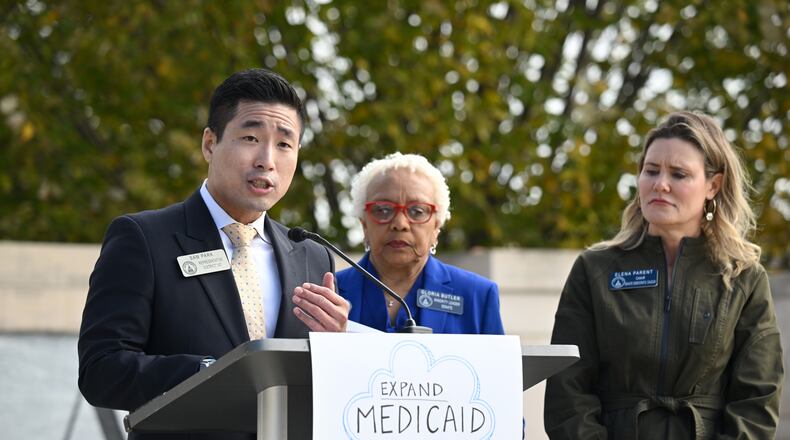The sluggish launch of Gov. Brian Kemp’s new limited Medicaid health insurance program for Georgia’s uninsured poor has left Democrats renewing their cries for full Medicaid expansion. Republicans are still not interested — at least not yet.
In statements to the AJC, Georgia GOP leaders defended the program, called Georgia Pathways to Coverage, which launched July 1. They instead sought to shift the focus to the Biden administration’s opposition to the Pathways program’s extra work and activity requirements.
Georgia is one of ten states that have refused federal funding to expand Medicaid to all uninsured adults below the poverty line. Georgia’s program instead offers Medicaid to those who can file monthly reports showing 80 hours a month of work or specified activities. The state’s own estimates agree that most people can’t or won’t meet the reporting requirements.
But the initial enrollment was worse than the most modest expectations. Following the news that just 1,343 people out of the estimated 370,000 in need had enrolled in Georgia’s program in its first three months, Democrats this week gave blistering reviews at a press conference and called for the full expansion.
Kemp and other Republicans have previously called full Medicaid expansion “unsustainable,” pointing to federal budget deficits.
“I’ve heard it said from Governor Kemp and my Republican colleagues that we should run the state of Georgia like a business,” state Rep. Sam Park, D-Lawrenceville, told reporters outside the Georgia Capitol. “Well, I don’t believe a rational business person would leave billions of dollars on the table and say no to creating tens of thousands of health care jobs across the state ... All so he can impose his own burdensome, complicated work requirements that leave some of our most vulnerable Georgians behind.”
Kemp’s own forecasts predict that about 90,000 people will meet the work or activity reporting requirements and end up insured under Pathways. Working to care for one’s own children or a bedbound relative don’t count.
Park also noted that research shows that even if the program reaches Kemp’s forecast of 90,000 enrolled, the state would end up covering fewer people while paying more money from its own coffers to run the program, than if it expanded coverage to all 300,000-plus in need. That’s because of the federal funding that comes with full expansion.
GOP leaders contacted by the AJC responded in unison. They cautioned to give the program more time, while bringing up the delay caused by fighting the Biden administration in order to enact work requirements.
“I really think we need to give Pathways more time to grow and mature,” said Rep. Matt Hatchett, R-Dublin, who chairs Georgia’s powerful House Appropriations Committee, overseeing the state budget.
Answering the pointed criticisms from Democrats, Hatchett added, “It was held up for such a long time by the current (Biden) administration, I believe we really should give it as long a time to ramp up as it took for final approval.”
A spokeswoman for Lieutenant Governor Burt Jones agreed. “This program is in its infancy because the Biden administration stood in the way,” said Jones’ spokeswoman, Ines Owens. “Governor Kemp has taken a multi-pronged approach to expand quality and affordable healthcare for Georgians. The Lt. Governor supports the administration and is excited that over 16,000 people have applied, showing strong interest in the program.”
Kemp announced his intention to launch the Pathways program within four days of taking office in January 2019, and was able to launch as of November 2022.
For nearly two years Kemp aides worked with the Trump administration to convince legislators and design work requirements that they thought could pass legal muster. It was tricky because courts had already struck down work requirements as not advancing the goals of the Medicaid law, which is providing access to health care. The Trump administration approved Georgia Pathways in October 2020.
Then for nearly two years the Biden administration, which favors full Medicaid expansion, joined the widely expected fight against Georgia’s work requirements. In fall 2022, a federal judge in Brunswick gave the Pathways program a green light, and the Biden administration decided not to appeal.
A spokesman for Kemp has made the same points defending Pathways’ early numbers. This week he emphasized that the governor’s health care plans interweave Medicaid with much larger plans including private insurance on the Affordable Care Act marketplace. Kemp has also worked to expand Medicaid to new mothers for one year after they give birth, up from six months.
Subsidies the state pays health insurance companies on the Marketplace have joined with Biden administration federal subsidies to make that coverage more affordable for people of all income levels.
“Gov. Kemp’s policies have led to over 600,000 Georgians gaining health insurance through the reinsurance program, expanded Medicaid for new mothers, and brought innovation to the Medicaid program,” said the spokesman, Garrison Douglas.
Douglas also noted that the Pathways program allows a slice of uninsured Georgians just above the poverty level to have private insurance at a low cost, whereas full expansion would put them on Medicaid, which fewer doctors take. He said more than 200,000 people just above the poverty line would be moved from private insurance to Medicaid. “The only failure here is (Democrats’) inability to come up with solutions that actually work for hardworking Georgia families.”
About the Author
Keep Reading
The Latest
Featured



